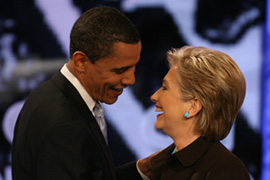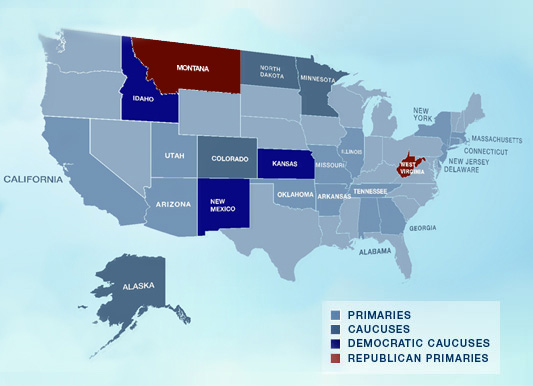Candidates ready for Super Tuesday
Al Jazeera’s Rob Reynolds on a big day in the race for the White House.

 |
| John McCain could be the Republican candidate by Wednesday morning [AFP] |
With just days to go before the big, nationwide primary called Super Tuesday, it is looking more and more as if the Republican race will soon be decided.
The Democratic race is less clear, and there is a good chance it will continue at least into March, if not all the way to the party nominating convention in August.
| In focus |
Republican senator John McCain is looking to knock his rival Mitt Romney out of the race on Tuesday.
McCain is far ahead in his home state of Arizona and is concentrating his efforts on a delegate-rich swathe of the northeast: New York, New Jersey, Connecticut and Delaware.
Those northeastern states represent nearly a quarter of the total Republican delegates at stake on Tuesday and McCain is running comfortably ahead in all of them.
In part, that advantage is due to his endorsement by former New York mayor Rudy Giuliani, who dropped out of the race this week.
California dreaming
Romney, a former Massachusetts governor, is hoping for victories in his home state of Massachusetts and in Utah – where his Mormon faith makes him a sure winner – as well as a string of smaller states including Colorado, Minnesota, Montana, North Dakota, West Virginia and Alaska.
| Super Tuesday | ||
A total of 24 US states are holding primaries or caucuses on 5 Feb It is the day when the largest number of nominating delegates for both Republicans and Democrats are up for grabs 52 per cent of Democratic delegates and 41 per cent of Republican delegates are at stake Key states include California – with the most amount of delegates for a single state – Georgia, Illinois and New York Started in 1988 after some southern US states decided to hold primaries simultaneously to boost southern influence in choosing a candidate |
He has hopes of remaining competitive in southern states like Alabama, Tennessee and Georgia, but his chances there are diminished by former Arkansas governor Mike Huckabee’s appeal to southern conservatives and evangelical Christians.
As he did in Florida last week, Huckabee is likely to drain away just enough voters in those states to deny Romney a win.
However, the real battleground for the Republicans will be in California, the most populous state in the union, with 170 delegates at stake.
While polls show McCain leading in the state, Romney is set to spend nearly two million dollars on California television and radio advertisements before Tuesday.
He is emphasising his conservative credentials in the hopes of sparking a backlash among right-wing voters against McCain’s more moderate stance on a variety of issues, especially immigration.
His strategy is to win at least half of California’s delegates, which are awarded on a district-by-district basis.
McCain got a boost in California this week with the endorsement of that state’s popular governor, Arnold Schwarzenegger.
And Romney will have to take valuable time out of campaigning in order to attend the funeral of Mormon leader Gordon Hinckley in Salt Lake City.
In a campaign appearance in the state of Colorado on Friday, Romney emphasised his experience in business management and knowledge of the economy, drawing a contrast with McCain.
But he repeatedly passed up opportunities to declare that he would continue to fight past Super Tuesday even if he does poorly, saying only: “We’ll see what happens.”
Polite debate
On the Democratic side, the race is tightening.
 |
| The last Democratic debate was a polite one [AFP] |
A nationwide Gallup poll published on Thursday showed Barack Obama reaching to within four percentage points of Hillary Clinton – the closest he has come thus far to her once commanding lead.
Neither candidate seems to have received a major windfall from the departure of former senator John Edwards, who dropped out without endorsing either of them so far.
A much-watched one-on-one debate Thursday in Los Angeles was notable for its polite tone, but failed to move either candidate’s numbers markedly.
In the state-by-state races, Clinton is ahead in her home state of New York, as well as Arkansas, Missouri, Minnesota and New Jersey.
Obama is leading in his own home state of Illinois, in several southern states, and in Colorado and Connecticut.
Once again the big battleground will be California – with 370 delegates at stake.
Latino vote
The state’s large Latino population also makes the race there an interesting one.
 |
| Obama was boosted by the support of Edward Kennedy [GALLO/GETTY] |
Clinton is both well known and well liked among Hispanic voters, who, as with other Democratic voting groups, recall the economic good times during her husband’s presidency.
She has also received endorsements from major Hispanic politicians including Antonio Villaraigosa, the mayor of Los Angeles.
Obama is at a disadvantage among Latinos because he is much less well known and has had very little time to introduce himself.
That is why the endorsement of senator Edward Kennedy and Caroline Kennedy, the only surviving child of John F Kennedy, the former US president, is so important for Obama.
The Kennedy family is greatly respected by many Latinos and in the homes of many older Mexican Americans it is not unusual to find a portrait of the late president hanging alongside a crucifix and icon of the Virgin Mary.
Whether the Kennedy endorsement will be enough to sway these voters in favour of Obama remains to be seen.
Both Democrats are planning for the race to go on, beyond Super Tuesday, and are building up financial war chests to finance a longer campaign.
No clear winner
Obama reaped a $32 million windfall in donations in January and is spending heavily on television advertisements in virtually all the Super Tuesday states, as well as nationwide.
In all likelihood, both candidates will emerge from Super Tuesday with roughly the same number of delegates.
That means the nomination battle could be determined by so-called “super delegates” – nearly 800 party and elected officials who will go to the convention officially uncommitted to any candidate.
Both campaigns are urgently courting those delegates right now.
Super Tuesday, once seen as the finish line for the Democratic contenders, now looks more like it may well be a midway milestone instead.
Super Tuesday Map
 |

